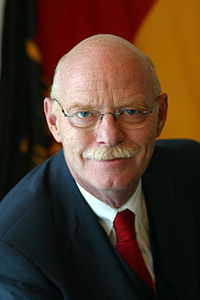Peter Struck
| Peter Struck | |
|---|---|

Struck in 2010
|
|
| German Federal Minister of Defence | |
|
In office 19 July 2002 – 22 November 2005 |
|
| Chancellor | Gerhard Schröder |
| Preceded by | Rudolf Scharping |
| Succeeded by | Franz-Josef Jung |
| Chairman of the SPD Parliamentary Group in the Bundestag | |
|
In office 27 October 1998 – 19 July 2002 |
|
| Chancellor | Gerhard Schröder |
| Preceded by | Rudolf Scharping |
| Succeeded by | Ludwig Stiegler |
|
In office 22 November 2005 – 27 September 2009 |
|
| Chancellor | Angela Merkel |
| Preceded by | Franz Müntefering |
| Succeeded by | Frank-Walter Steinmeier |
| Personal details | |
| Born |
24 January 1943 Göttingen, Lower Saxony |
| Died | 19 December 2012 (aged 69) Berlin |
| Nationality | Germany |
| Political party | Social Democratic Party |
| Alma mater |
University of Göttingen University of Hamburg |
| Profession | Lawyer |
Peter Struck (24 January 1943 – 19 December 2012) was the German Minister of Defence under chancellor Gerhard Schröder from 22 October 2002 until 2005. A lawyer, Struck was a member of the Social Democratic Party.
Struck studied law at the universities of Göttingen and Hamburg. In 1971 he graduated to Dr. iur. (Doctor of Laws).
Peter Struck was a member of the Bundestag from 1980 until 2009. He first became a member of the Bundestag in the 1980 West German elections, via the party list, for the constituency of Celle-Uelzen. Due to his growing popularity, in the years 1998, 2002 and 2005, Struck was directly elected. From 1990 to 1998 he was whip (Parlamentarischer Geschäftsführer) of the SPD parliamentary group. From 1998 to 2002 he was chairman of the SPD parliamentary group.
In 2002 Struck succeeded Rudolf Scharping as Federal Minister of Defence, and served in that position until 2005.
During Struck’s tenure, Germany was trying to revamp its military into a nimbler fighting force capable of responding to smaller, regional conflicts. While being a strong supporter of conscription, Struck announced in 2003 that Germany would reduce its military by more than 10 percent by 2010, leaving 250,000 troops. Also, he ordered a reduction in Germany's inventory of heavy Leopard 2 tanks from almost 2,000 to 350. At the time, he said the cuts were necessary because of strained finances and a need to adapt to new security needs; in 2003, he had to work with a defence budget of a mere 1.48 percent of Germany’s gross domestic product, compared with the 2 percent average of his European Union counterparts. Under Struck’s plan, the military's civilian work force was to be reduced by 45,000, to 75,000, and as many as 100 military bases closed.
...
Wikipedia
